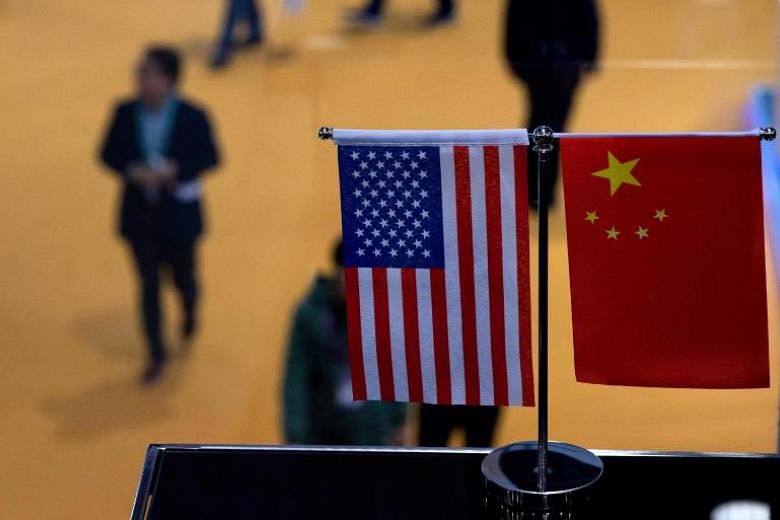SINGAPORE - A worrying trend is starting to happen in the Sino-United States relationship, with attitudes on both sides hardening towards the other party, said Prime Minister Lee Hsien Loong, as he cited examples in each country.
In his keynote address at the Shangri-La dialogue on Friday (May 31), he said a negative view of China is the norm not just in the White House but is also shared widely by Congress, the military, the media, academics and non-governmental organisations..
Likewise, a mistrust of the US intention towards China is widespread among its government and opinion makers, he said.
In the US now, Mr Lee said the security establishment officially describes China as a "revisionist power" and a "strategic competitor".
He said the recent Presidential Executive Order on securing the information and communications technology and services supply chain stated that it is aimed at "foreign adversaries".
"It stopped just short of naming any specific country, but made quite clear what actions the US intends to take," said Mr Lee.
He added that there is a growing bipartisan consensus across the Republican and the Democratic parties that China has taken advantage of the US for far too long; that China has overtaken, or will soon overtake, the US in areas of advanced technology, such as artificial intelligence and some aspects of military technology, through underhand means.
The consensus extends further into how "instead of opening up and becoming more like the US, China has regressed in terms of political openness, and hence represents a challenge to American values and leadership", he said.
"Americans now talk openly of containing China, and to do so soon before it is too late, the way they used to talk about the USSR and the Soviet bloc," Mr Lee added.
Even American businesses, which used to be the strongest supporters of China because they profited from China's growth, have soured, he said.
Describing how US businesses had strongly advocated China's accession to the World Trade Organisation and acted as a balancing act that counselled good relations with China when protectionist or nativist sentiments built up in the US, Mr Lee said: " Now, that goodwill has all but evaporated."
He said US businesses "feel let down" that China has not adjusted its policies on trade and investments and systematically disadvantages foreign businesses operating on its soil while its firms operate uninhibited in the US, he said.
"This loss of goodwill on the part of an important constituency is a serious problem for China, which the Chinese have not fully appreciated or dealt with," said Mr Lee.
In China, he said a section of Chinese opinion is convinced that the US will never be satisfied and will thwart China's legitimate ambitions, irrespective of what the Chinese do or concede on individual issues.
"They are alarmed by talk of a 'clash of civilisations' between the US and China. They reject what they see as efforts by the US to impose its political system and values on China," said Mr Lee.
Nationalist fervour in China is bubbling, he said, with television stations re-broadcasting old movies of the 1950-53 Korean War, which is known in China as the war to resist America and assist North Korea.
On the Internet, a "US trade war song" is popular, derived from a musical track from a 1960s war movie about the Sino-Japanese War.
"Hardly anyone in China, whether in government, academia or the media, can be found who is prepared to speak up for a more positive and benign interpretation of the US' intent," said Mr Lee.
He identified a mutual lack of strategic trust as the fundamental problem between the US and China, saying it bodes ill for any compromise or peaceful accommodation.
While going down the present path would be a serious mistake on both sides, Mr Lee said there is no strategic inevitability about a US-China face-off. And if it were to happen, it will be nothing like the Cold War.
First, there is no irreconcilable ideological divide between both sides. China may be communist in political structure, but it has adopted market principles in many areas.
Second, China has extensive economic and trade links with the world, unlike the USSR, whose economic links outside the Soviet bloc were negligible.
But while it would be up to the countries' political leaders to avoid a conflict which would inflict serious damage across the globe, it is hard as leaders on both sides are facing powerful domestic pressures, said Mr Lee.
He said the political mood in the US is deeply divided and disgruntled, with declining confidence in globalisation and multilateralism, and with nearly half of all Americans having an unfavourable opinion of China.
"As the presidential elections approach, these attitudes will surely deepen, because neither the Republicans nor the Democrats will want to risk being accused of being 'soft' on China," said Mr Lee.
"Regardless whether President Trump is re-elected, or another Republican or Democrat wins, these sentiments will not go away."
In China, leaders face strong internal pressures too although they do not have US-style presidential elections, he said.
"They know they have major issues to deal with at home," said Mr Lee, listing some of them as uneven growth, rural poverty, an ageing population, and rising expectations for a better quality of life.
He said both sides are sensitive about being perceived as weak, citing how the US wants to show that it has come out ahead in any deal whereas Chinese leaders, deeply attuned to history, cannot afford to appear to succumb to Western pressure to accept an "unequal" treaty.
Describing how this zero-sum dynamic makes it very hard to construct an agreement that is politically acceptable to both parties, Mr Lee said that ultimately, it is in the interests of both the US and China to reach such an accommodation, and to persuade their domestic publics to accept it.
"They both need to keep their relationship steady, so that both can focus on their respective pressing domestic priorities, and not be distracted by troubled relations with the other," he added.



